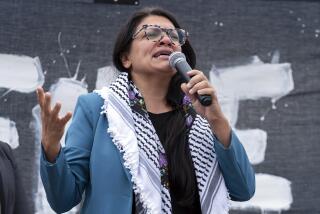‘Siege’ Portrayal Furthers Trend of Ridiculing Arabs
In many respects the career of actor Tony Shalhoub is an interesting representation of the toil and struggle against the marginalization of minorities in the Western world; it symbolizes professional triumphs, valuable contributions to society and importantly signifies hope for those like him. Sadly, however, it also reflects the sometime acquiescence to a cultural hegemony and capitulation to the stereotyping of minor cultures by major ones (“Caught in the Middle,” Calendar, Nov. 3).
It is ironic that an actor who professes to having shunned previous parts as an Arab character because of negative portrayal would step up to defend this specific role in “The Siege,” directed by Ed Zwick. Undoubtedly, Mr. Shalhoub’s passionate insistence that you “have to be able to tell a story and allow the story to take a life of its own” is laudable; as is prodding public consciousness to a place of reckoning. Yet there is a great naivete at play here. Simply put, this reader--like many others of Arab and non-Arab extraction--does not believe that it is the express hope of this film to, at some point in the plot, arouse sympathy for Arabs in its supposed morality play.
To justify the vicious treatment of a sector of the Arab American population in this film as being a sophisticated warning that extremism may cut both ways is too simple a thesis. For the history of Arab roles in film is so littered with negative portrayal, trivialization and dehumanization that the sentiment clearly does not ring true. It is at best a history of tactless misrepresentations of Islam. Indeed, it is not lost on many that the sympathetic Arab character in this film is not a Muslim. It may be that this particular Arab--Mr. Frank Haddad--is deemed a little more palatable to audiences by the writer(s) and director.
Perhaps if the trailer for this film was not so inflammatory and ridiculous one may not be so quick to send out the jury. Regrettably, however, the trailer was just that--from scenes of an internment camp full of Arabs to demonstrating Arab crowds holding aloft scribbled placards.
And it is the scribble that is the most telling pointer of the film industry’s utter disregard for Arabs the world over. It has never ceased to amaze me that in an industry where, say, the minutiae of Amish or European Renaissance cultures are accurately and painstakingly depicted, that of the Arabs is merely cartooned. Our writing is no more than a mess of incomprehensible curly lines, our culture and the religion of Islam only a basis for suspicion by those who value “the American way.” This lack of attention to detail suggests that the makers of this film were never interested in providing a balanced view of hypothetical events. Instead, a skewed version of Islam and whatever qualifies as a visual representation of “Arabness” are conflated to create the new anti-American demon. Indeed, the phrase used to market the film, “Freedom is history,” smacks of the kind of jingoism that defines many racist agendas.
The film industry at large would do well to recognize that Arab culture is complex and multifaceted and that its religions and tongues are many. We take umbrage at the very negative, demeaning and racist portrayal of Arabs and Arab culture in films such as this. The Arab population in this country, and abroad, is and will be insulted yet again. At a time when peace is gaining its deserved currency as the way forward in the Middle East, films like this serve only to perpetuate the simplistic notions that have fueled wars.
This is a mere fragment of my--and others’--thoughts on this deplorable situation. It is my hope that some day soon we achieve a fair and balanced view of the differences in this world and represent them so. Irresponsible representations can only aggravate and further alienate our already maligned culture and peoples. Wounds will never heal when this kind of insensitivity is peddled.
Shame on all associated with the making of this film. Shame on Mr. Shalhoub, Ms. Benning, Mr. Washington, Mr. Willis and Mr. Zwick for what will only be construed by many as a green light for the hatred and ridicule of them by others.
Mohamed Sharif is an L.A.-based architect.
More to Read
Only good movies
Get the Indie Focus newsletter, Mark Olsen's weekly guide to the world of cinema.
You may occasionally receive promotional content from the Los Angeles Times.










